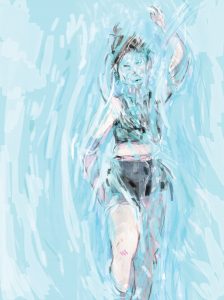A letter from the next lane
By Cara Seccafien, Illustrator
Dear Splashy Man,
You probably do not know who you are. Your awareness is lacking. To a certain degree I understand how you became this way. When you are partially underwater, the experience of someone above the surface is always a bit challenging to comprehend. I understand your passion for swimming and your love for the pool. I understand that when you are in love, your inhibitions are down.
Let me tell you who you are in case you have not caught on. Frequenter of Templeton Park and Britannia Pools in East Vancouver. White or white-passing person, cis man or cis-passing person. Roman nose (I like your nose, this is not a judgement). Mint green swim cap. Favours the front crawl. Occasionally practices the butterfly stroke. Splashes everyone around you. A lot.
You probably do not know who I am because I do not splash you. I know who you are because I favour the backstroke and every single time I feel water wash over my face, I look up and see that mint green swim cap. Every. Single. Time.
I have a bit of a motto that I live by and I’d like to offer it to you. It is critical to spend time sorting through your judgements, to question everything you are taught, and to observe how your life experience impacts the ways in which you move through this world because when your inhibitions are down, all of that comes flooding out. Splashy man: Your inhibitions are down, everything is flooding out, and you are obviously not aware of the ways in which you move through the pool.
Do you know how long it took for me to become comfortable taking up space at a public pool with my nearly naked body?
I started swimming over a year ago; I’m not sure exactly when I started coming regularly. I went weekly with my pool friend (who is also my best friend) Emily, and at some point I started coming two and three times a week. About six months ago, Emily said that she had become a pool bitch and I thought I had too. A pool bitch, I think, is someone who is confident and comfortable taking up space at the pool and is not afraid to ask for that space.
But that’s not how long it took. The truth is I swam as a very young child. My family and I went to the beach every summer for as long as I remember. My parents did not teach me to swim at all, but I played in the water. My sister has told me stories of my dad throwing her into a deep part of lake to teach her, but I have no such memory.
Through elementary school, I participated in swimming field trips, then lessons, but I was always “afraid” of the deep end and always “behind” other kids my age in terms of skill. I do not believe that my fear of the deep end was really about sinking or swimming. I had childhood anxiety punctuated by embarrassment about my body. I was embarrassed about both not being feminine enough and being too feminine (read: genderqueer baby). Most young girls and AFAB (assigned female at birth) people are self-conscious about their bodies. I also had an intense fear of death and I think at some point I equated the deep end with a quick death, in my swimsuit, among my entire class. I remember a distinct fear that if I dived, I would crack my skull on the bottom of the pool and no one would notice that I never came up for air.
And just like that, swimming was another boys’ club that I just did not join. Which is ridiculous because since when is swimming a boys’ club? Obviously, many girls at my school and at the pool swam well and happily and did not appear to be self-conscious. But anything can feel like a boys’ club when boys are having fun, splashing, and taking up space, and girls are afraid.
By high school, it didn’t matter anymore if I was good or bad at swimming because when I went to the pool, my anxiety was so bad that I would be unable to float at all due to muscle tension.
Nine years of therapy and 30 milligrams of citalopram later, I realized it was time to integrate exercise into my self-care routine, and swimming was really the only form of activity I wanted to try. It helped that my best friend would come with me.
So you see, Splashy Man, most of the time I don’t think about the whole story. I don’t think about how I could have loved swimming from a very young age. I don’t think about how many years of pleasure I was robbed, how many therapists told me to try exercising to manage anxiety, and why it was so difficult to take their advice. What I did not tell you, Splashy Man, is that this fear of exploring the capacity of my physicality was not just a swimming problem. When you look at it that way, you cannot deny that I share this story with other AFAB people, women, and girls.
However, when you splash and in turn take up more than half a lane of space, which is the amount we are each allotted at the public pool—and you don’t take it up because of your size or your needs, but because you can’t seem to master an efficient stroke, and that water goes over my face and up my nose, and I feel like I’m going to drown which means I could die, and I see your mint green swim cap—I do think of the whole story, and I do feel robbed, and I do feel angry.
Despite this, I have vowed to not let you, Splashy Man, ruin my swim. I love swimming. I actually do not care if I am “good” at swimming anymore. I love that my body can do something other than think and read and write and draw. My body feels soft and calm and cool and weightless in the pool. When my ears are underwater, I relish in a break from all of the auditory stimulation that normally drains me. I spend half of my time at the pool either in the hot tub, steam room, or sauna, just doing nothing. That part is lovely. Also, endorphins are real, people.
Sincerely,
Cara Seccafien




